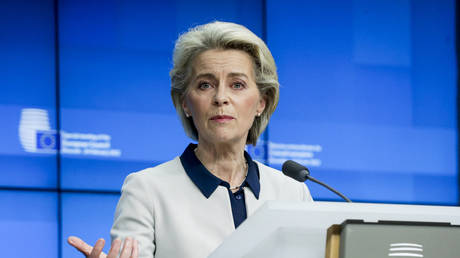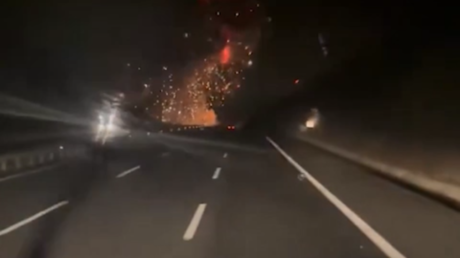
European commission president Ursula von der Leyen has said Brussels will stand behind Ukraine nevertheless
The president of the European Commission, Ursula von der Leyen, has acknowledged that the sweeping sanctions the bloc has imposed on Russia in recent days over Moscow’s military operation in Ukraine will have a negative impact on Europeans, too.
Responding to a Euronews correspondent’s remark on Sunday that “of course Europeans and Europe will have to pay a price for these measures,” von der Leyen replied in the affirmative, saying that “every war comes at a cost.”
However, according to the official, Brussels is not daunted by the possible economic blowback from the Russia sanctions, and will continue to prop up Ukraine with a “strong solidarity.”
The EU boss listed the bloc’s willingness to take in Ukrainian refugees, the “financial support,” as well as the “military equipment support” as proof that the EU is committed to backing Kiev.
The European Commission president also opined that Ukraine shares “EU values” and is defending its “principles.”
On Friday, Paschal Donohoe, the Irish Minister for Finance and President of the Eurogroup – a body that is comprised of finance ministers of the Euro area – also stated that “there will be economic costs” for Europe which “will emerge over the coming weeks and months.” The official added that the “impact will be different for different member states.” Donohoe reassured everyone, however, that the Euro zone’s finance ministers would review their fiscal plans in the near future, and make sure there was enough support for the European economy.
The president of the European Central Bank, Christine Lagarde, for her part, said that she saw rising energy prices and sagging business confidence and consumption as the two main risk factors for the EU’s economy. She clarified that “persistent uncertainty will probably be a drag on consumption and investment, and will impede growth,” while dismissing concerns over the sanctions’ impact on trade as insignificant.
European Commission Vice President, Valdis Dombrovskis, too, suggested that the “crisis will weigh on EU growth,” however, according to him, it “will not stop EU growth” entirely.
Since February 24, the EU as a whole, as well as individual member states, have slapped a raft of crippling sanctions on Russia, with the freezing of Moscow’s central bank’s assets being one of the latest blows.
Last Thursday, Russian President, Vladimir Putin, announced the beginning of what he described as a special military operation in Ukraine, with the aim being the “demilitarization and denazification” of the country. Ukraine and its Western allies accused Russia of waging an aggressive war and seeking to install a pro-Russian puppet government in Kiev.




